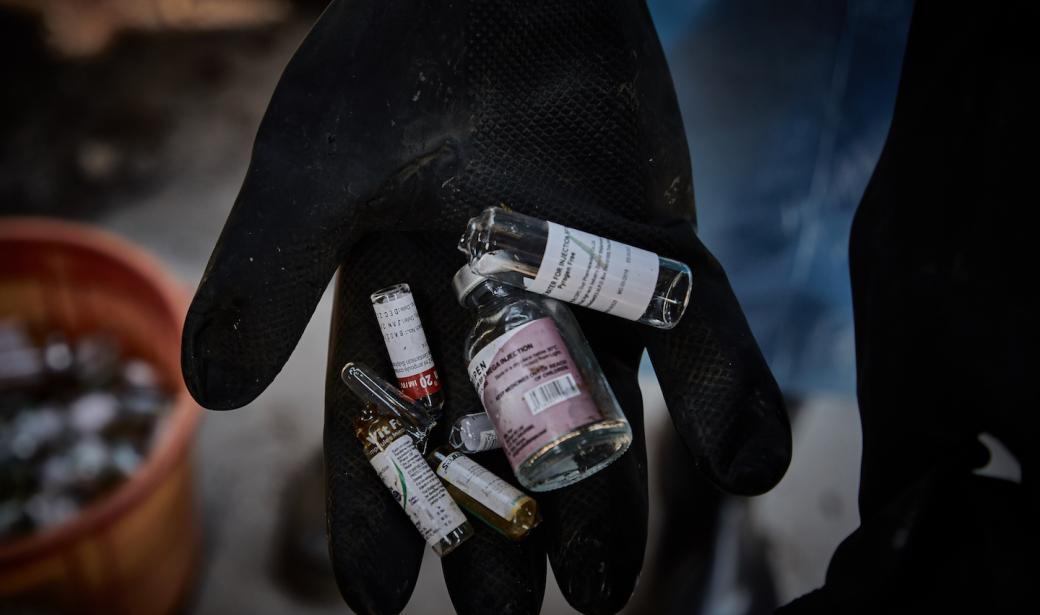Photo: Hugh Kinsella Cunningham
Kitatumba Reference Hospital nestles on a hill in Butembo, which has been fighting an Ebola outbreak for the past year. With more than 80 health workers infected with Ebola since the outbreak came to the city in the eastern Democratic Republic of the Congo, health facilities like Kitatumba are critical battle fronts. “This hospital was built in 1923, and many of the buildings are old, which makes it a challenge to maintain infection prevention and control standards,” says Dr Eugene Syalita Nzanzu, the Medical Director.
Photo: Hugh Kinsella Cunningham
Dr Didier Mwesha was the World Health Organization’s (WHO) first infection prevention and control expert to visit Kitatumba Reference Hospital, in late August 2018. “I was concerned by what I saw. Key guidelines on controlling the spread of infections were not being respected. So, we got to work training staff on infection prevention and control practices and providing essential materials, such as personal protective equipment, chlorine, buckets, etc.”
Photo: Hugh Kinsella Cunningham
A major challenge for the hospital is the lack of a regular water supply. “Water is fundamental for any effective infection control programme,” says Dr Nzanzu, the Medical Director. To improve the situation, WHO provided the health facility with a tank that can collect up to 10 000 litres of rainwater.
Photo: Hugh Kinsella Cunningham
Kitatumba hospital also treats some 500 inpatients a month, like 27-year-old Masikasafi Kavugho, who gave birth to her son three weeks ago. At 1.8 kg, the baby was born underweight, and mother and child had to remain in the hospital for extended care but are about to be discharged. “I feel good and my baby has been well taken care of,” says Kavugho.
Photo: Hugh Kinsella Cunningham
The happy outcome of Kavugho’s hospital stay is a tribute to the more than 70 health workers employed there, who, in the past year as part of the Ebola response, received training on infection prevention and control. Helene Masika (above) is a midwife and says that newborn babies need to be especially protected from infection because of their fragility.
Photo: Hugh Kinsella Cunningham
A monumental part of the infection prevention and control training that health workers receive is is on good hand hygiene practices, including how and when to wash their hands in between patients and on glove use. In collaboration with the Ministry of Health and other partners, WHO uses an evaluation (known as the “scorecard”) to measure how well health facilities are implementing infection prevention and control standards. A year ago, Kitatumba’s compliance rate was 25%, which it managed to raise to 50% early this year. But then its progress plateaued. This was the case for many health facilities in Butembo. From January to September this year, an estimated 19% of all cases in the Butembo Ebola outbreak were linked to hospital visits.
Photo: Hugh Kinsella Cunningham
In May, the Ministry of Health, WHO and partners instituted a new programme aimed at further strengthening infection prevention and control in health facilities. In just three months (June to September), the Kitatumba Reference Hospital managed to raise its compliance rate from 69% to 89% (using the scorecard). The scorecard measures several indicators, such as the safe disposal of medical waste. The hospital is now crushing this waste and burying it in underground pits. “Unfortunately, it’s common to find used syringes and medical vials lying around the disposal area of hospitals, but that’s not the case in Kitatumba,” says Dr Mwesha, the WHO infection prevention and control expert.
Photo: Hugh Kinsella Cunningham
Paluku Ngolosamy (above), the Director of Nursing at Kitatumba Reference Hospital, says the training and support that the hospital has received in infection prevention and control is ensuring not only that Ebola does not spread but is benefiting all the facility’s patients and staff members in terms of improved protection from a range of possible infections. The main diseases Kitatumba treats are malaria, typhoid, acute respiratory infections, sexually transmitted infections and tuberculosis.
Photo: Hugh Kinsella Cunningham
Other beneficiaries of the hospital’s efforts are nursing students who, as part of their course work, are receiving infection prevention and control training. This September, the hospital was one of five health facilities to receive a certificate from municipal authorities for improvements. “Kitatumba is the health facility that has made the most progress in infection prevention and control in Butembo,” says Dr Mwesha. “Long after the Ebola outbreak is over, the hospital’s commitment to global standards will protect patients with a range of infectious diseases during their hospital stay.”
Pour plus d'informations ou pour demander des interviews, veuillez contacter :
Collins Boakye-Agyemang
Communications and marketing officer
Tel: + 242 06 520 65 65 (WhatsApp)
Email: boakyeagyemangc [at] who.int (boakyeagyemangc[at]who[dot]int)
Sakuya OKA
Communications Manager
WHO Regional Office for Africa
Email: okas [at] who.int (okas[at]who[dot]int)
Tel: +242 06 508 1009












